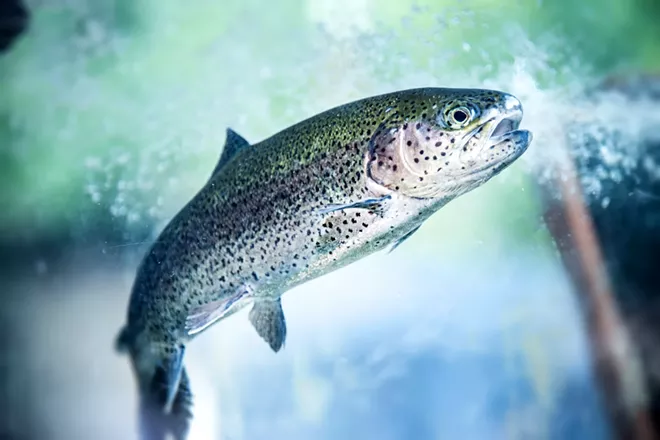In 2016, I ran for governor of Washington as a Republican, aspiring to lead in the tradition of Washington Republican Dan Evans and Idaho Democrat Cecil Andrus, both ardent conservationists responsible for national and state parks, recreation and wilderness areas, wildlife refuges and national forests — and who both had supported my political career.
That I finished shy by about 4.5 points wasn't inevitable. In late spring 2016, the race with Jay Inslee had tightened, but once Donald Trump was nominated it was as if I were fishing and a pontoon of partying tubers floated by, scaring from the pool those I needed to land: independent voters.
The night I lost my bid to become Washington's governor, I remembered one fall day before campaigning began, when I went head to head with a hog of a cutthroat.
I was in Wyoming with some time, but foolishly without gear, so I called a friend who recommended a fly shop. Before I knew it, I was bouncing down a road in a guide's rig. It was still morning, but warming. Aspens radiated topaz; blood maroon tinged the bankside bushes; snow powdered peaks pierced a spa-calming blue sky.
We fished. I landed a few trout, but not ones you jot notes about. The one a few casts later, that one I went back to my hotel and wrote about: about our conversation, about the color of the trees, and about the eagle — yeah, the eagle — that soared barely over my head right before it happened.
The moment before my cast still swaddles me. The swishing current, the plunging beaver, the geese heralding the impending dark. Then, I saw it. Momentarily, but I saw it, in the seam, where the current folded. I placed my fly just on the other side of the foam.
My guide whispered, "That's it, perfect."
"Oh, he's moving away, damn."
"Wait. Yeah, easy, here he comes. Slowly."
A few seconds later, murmuring to myself, the guide, the fish: "Yeah! Come on!"
He took it. Strike. Set. Tight. On.
"Good job. OK, give him some line, he's a big one."
"I'm going to tire him out a bit," I said. If the fish thought at all, I bet it was thinking the same thing.
I'm collapsing this sort of blood-pulsing yet hushed dialogue that went on and on for what seemed like 40 minutes, but might have been 12, likely longer. Time disappeared. I was focused on not losing the fish.
When a big fish rises from the depth, from an overhang, a rock's shadow, from the camouflage of foam and takes your fly, that, sorta as is written in Hebrews, is the "substance of things hoped for, the evidence of things not seen." And when hope and faith manifest themselves in substance, as they do with such a rising and taking, when I've freakin' hooked up with what I've desired, there's a bit of performance anxiety. No one wants to lose the big one.
The key is finding the fulcrum between bringing a hog into the net and snapping the line. One wants to be on the net side of that fulcrum. Duh, but how?
Well, it's never the same. In the outdoors we can learn techniques, but reeling in a hog requires adapting techniques to the moment, the current, the fish. And in the outdoors, we learn we can't control everything.
At some point, I had to make my move. Every minute I kept playing him was a minute I might lose him.
I reeled in line.
He didn't like that; the fish, I mean — the guide was fine with it.
"I'm going to let him run," I said, as if it were my choice.
"You're playing him perfectly."
Eventually, I said, "OK, I'm bringing him in on this side."
The cutthroat fought, shooting vibrations through my tiring arm.
That is when the bald eagle soared only feet above my head.
"You see that?" I asked, not referring to the eagle.
"Twenty-two inches?" he reverently breathed.
Nearing the net, just beneath that wavy band of diffusing light and water was a fish the color of the aspens, its translucent rosy golden gills and red cut glistened.
Then, snap!
The rod snapped. Broke.
The guide screamed, "Grab the line! We still got him. Bring in the line."
"Damn, he's gone! What did I do wrong? Why'd that snap?"
"It just snapped, should never've done that, look, it broke here, not at the seam — just, snap. Damn, congratulations man, that was a fish!"
We locked hands high in the air despite finishing shy of the landing — something I remembered on election night 2016.
Don't misunderstand, I prefer winning days, but my experiences outdoors, and in particular that fish and that rod, that morning, have taught me to enjoy the journey, not just the finish. As long as we defend public lands, others can learn such lessons, and we can return to fish another day.
John Muir emphasized the importance of public lands when he wrote: "Thousands of tired, nerve shaken, over civilized people are beginning to find out that going to the mountain is going home; that wilderness is a necessity; and that ...[national] parks [and forests] ...are useful not only as fountains of timber and irrigating rivers, but as fountains of life."
In 2022 and beyond, let's all commit to preserving and protecting our public lands, not only for ourselves, but so generations who follow can go to the mountain and return with lessons that will guide them. ♦
Bill Bryant, who served on the Seattle Port Commission from 2008-16, ran against Jay Inslee as the Republican nominee in the 2016 governor's race. He is chairman of the company BCI, is a founding board member of the Nisqually River Foundation, and was appointed by Gov. Chris Gregoire to serve on the Puget Sound Partnership's Eco-Systems Board. He lives in Winthrop, Washington.

